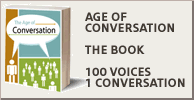
Results for articles with tag 'harrypotter' (2 total)
The project and its assignments range from lighthearted (snap a flash photo under your bed) to thoughtful (feel the news) to painfully real and honest (spend time with a dying person), and the responses are so impressive and unexpected, that it's just as amazing to look at them as it is to make your own.
An uncountable number of brands have also given the public a chance to express their creativity. It's the age of user generated content and it seems everyone has utilized some type of contest or opportunity for people to make their own commercials.
At first glance, Learning to Love You More might be mistakenly lumped with those efforts. But here's why it's not:
For one, the assignments are purely self expressive. The content is not merely an interpretation of the brand from the user's eyes - it is the brand. There is a book you can buy, but without the participants the product would be nothing. How many brands can say that about their content?
Furthermore, it creates an experience. It adds something to people's lives. According to Lovemarks by Saatchi & Saatchi, that's the level of communication brands need to aim for if they are going to compete in the future of branding (which they paradoxically dub "the future beyond brands.")
Another example of a lovemark that has influenced users to generate content (and also that falls into the same self expressive/experiential realm as Learning to Love You More) is the "fan fiction" created by readers of Harry Potter. The readers are so emotionally tied with the brand that they create their own stories about the book's characters. At one point it got so out of control that JK Rowling announced that her fans' fiction was actually true and intended.
Instead of recognizing it as the ideal version of user generated content that it was, she ruined the experience and more importantly, the self expression of millions of fans.
As user generated content moves from the road of innovation to the beaten path, it needs to be thought about differently. It seems a litmus test for a truly experiential dialogue could be, if we took away the marketing, could the experience still exist?
If the answer is no, we're still just making ads.
Posted by katie facada
Both these stories suggest that it’s easy to get fat and lazy; either you borrow someone else’s innovation, take it into a new category call it your own, hoping people will respond or you continue to milk the same franchise until time runs out.
The problem with both these initiatives is that they lack fundamental foresight.
Surely, execs at Bloomsbury must have been aware that not having any Harry Potter books to publish would result in profit and revenue declines.
Influx would have loved to be in the meeting with the fireplace manufacturer where the embedded iPod was given the go ahead.
Did anyone question it?
How did they justify it- everyone’s doing it- so we should?
In the end, this is all about timing.
Had the fireplace manufacturer come up with the idea two years back; there’s a slight possibility it would not have been ridiculed.
Had Bloomsbury started thinking about acquisitions and finding the next Harry Potter, three years ago, things might have been different.
The time to look for the next new thing is right after you had your first success.
You shouldn’t wait till problems strike to innovate.
Innovation is not just a way out of a problem; it’s a continuous process to ensure that you don’t get into trouble in the first place.
The secret is to never to stop and you don't get so drunk on success that you press “pause” on the innovation engine.
Articles for tag harrypotter (2 total).
